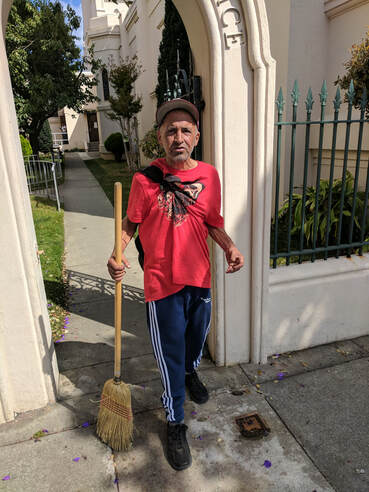On Good Friday many pastors lead their congregations in the Stations of the Cross, even staging outdoor dramas of Christ’s road to Calvary. Christians long to accompany him, to walk with him in his mighty labor of saving the world. To “accompany” someone is not merely to "meet someone where they are at” and leave them there. "Accompaniment" is walking with someone beyond their poverty, offering him the support to get past their addictions and dependencies. I remember giving a pound sterling to a homeless man on the streets of Edinburgh some years ago. He was selling a small magazine published by the homeless of the city. It had poetry, articles, and photographs composed by the homeless, and the title of the publication was “A Hand Up, Not A Hand Out.” Christ, the poor man, wants a hand up as he makes his way through the Passion, not a hand out. He gladly accepts Simon of Cyrene’s help with his heavy cross, but he refuses the narcotic-laced drink offered by the Roman government. He does not shrink from any part of his difficult mission, but he welcomes the help of those who would accompany him along the Way of the Cross.
A homeless man in San Francisco, Michael, has been coming to our parish off and on for five years. He always asks for money, but he always also asks for work: “isn’t there something I can do around the parish?” Sometimes I give him odd jobs to earn the twenty-dollar bill I usually give him, but I don’t give him the $20 if it seems he is becoming dependent on hand outs. He struggles with addictions of all sorts, mostly drugs, partly because he has been much abused by the so-called “sexual liberation” of our time. His parents divorced when he was young and he was raised in foster homes; he has no family to love him now; he may well have been abused throughout his childhood; he certainly was exposed to toxic and addictive things as a child.
Yesterday he came into the church while I was at holy hour. He sat behind me for half an hour, and then ventured to ask me if I had any time to talk. "I'll be done in 15 minutes" I said. When we met he told me how he was almost completely off meth, and how the City of San Francisco has given him a room in a fleabag hotel. The government gives him food stamps. As with the tens of thousands our city governments sustain in a kind of purposeless limbo, Michael is not expected to work. He laments that if he did work, he would lose his room in the fleabag hotel. The government keeps him just dependent enough to keep him quiet, but Michael is losing his humanity. He is a number, a kind of bovine creature the government keeps in a kind of stall in the Tenderloin. He is struggling to keep off opioids, but what is a man to do all day without a purpose in society? Our government must learn to trust the people again, especially local community and church organizations, to care for their own people.
The progressive elites who use taxes to maintain this system, no doubt, think that they are doing the right thing. Well, at least some of them. Others are making a lot of money on the “homeless industry.” The over-engorged government and welfare systems began, I think, with the best of intentions, inspired no doubt by a Christian culture that aspires to care for the neediest. But what Michael needs is not a hand-out. He needs a hand-up, and he cries out for it. “Give me some work,” he pleaded with me yesterday, with tears in his eyes. “But you have to pay me under the table, because if the government finds out that I’m working, I will be back out on the street.” I told him I would try to get him some work around the parish, gave him $20 a pair of reading glasses, and urged him to pray often to God. "Only He can help you," I said.
"One more thing," he said. "Do you have any cologne?" Rats. I had just run out. "I'll have some for you the next time," I said.



 RSS Feed
RSS Feed